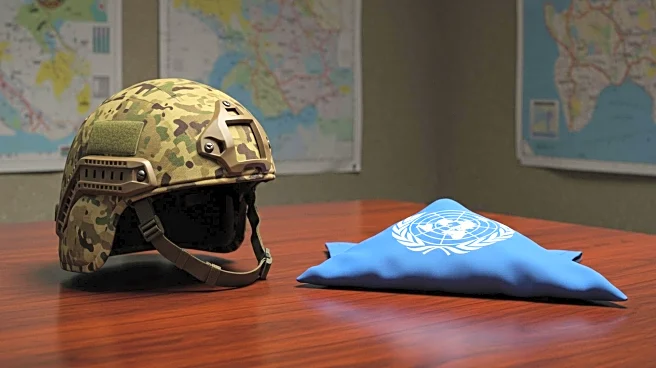What is the story about?
What's Happening?
The Israeli Defense Forces (IDF) have disclosed that a senior officer in the Lebanese Army collaborated with Hezbollah, an Iran-backed terrorist organization, to cover up the killing of a United Nations Interim Force in Lebanon (UNIFIL) soldier. The soldier, Private Sean Rooney from Ireland, was killed in December 2022 while traveling in an armored UN vehicle en route to Beirut. This revelation highlights the complex and often tense relationship between the Lebanese military and Hezbollah, which has significant influence in Lebanon. The IDF's announcement underscores ongoing concerns about Hezbollah's activities in the region and its impact on international peacekeeping efforts.
Why It's Important?
This development is significant as it raises questions about the integrity and independence of the Lebanese Army, which is supposed to be a neutral entity in the region. The collaboration with Hezbollah could undermine international trust in Lebanon's ability to manage its internal affairs and maintain peace. For the United States and other countries involved in UN peacekeeping missions, this revelation may prompt a reassessment of their involvement and strategies in Lebanon. It also highlights the broader geopolitical tensions in the Middle East, where Iran's influence through groups like Hezbollah continues to challenge Western interests and stability.
What's Next?
The disclosure by the IDF may lead to increased scrutiny of the Lebanese Army and its relationship with Hezbollah. International bodies, including the United Nations, might demand further investigations into the incident and the Lebanese Army's role. This could result in diplomatic pressure on Lebanon to address the issue and ensure the independence of its military forces. Additionally, countries contributing to UNIFIL may reconsider their participation or push for reforms to safeguard their personnel.
Beyond the Headlines
The collaboration between the Lebanese Army and Hezbollah raises ethical and legal concerns about the accountability of military forces in conflict zones. It also reflects the challenges faced by international peacekeeping missions in regions where local forces may have conflicting loyalties. This situation could lead to long-term shifts in how peacekeeping operations are conducted, with a focus on ensuring transparency and accountability.
















